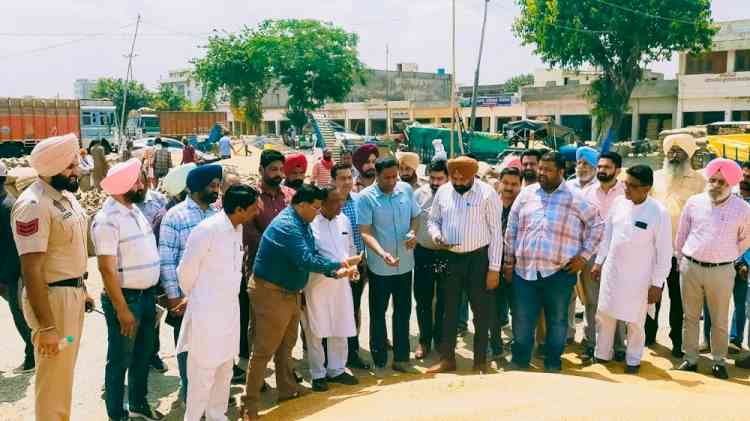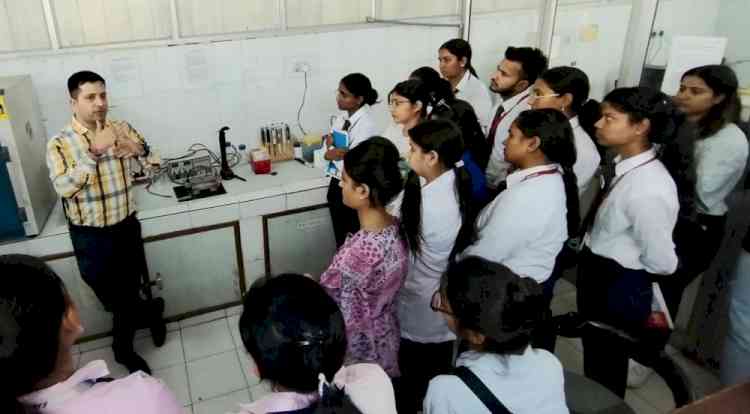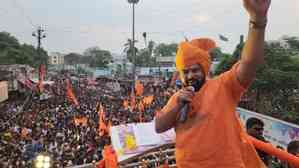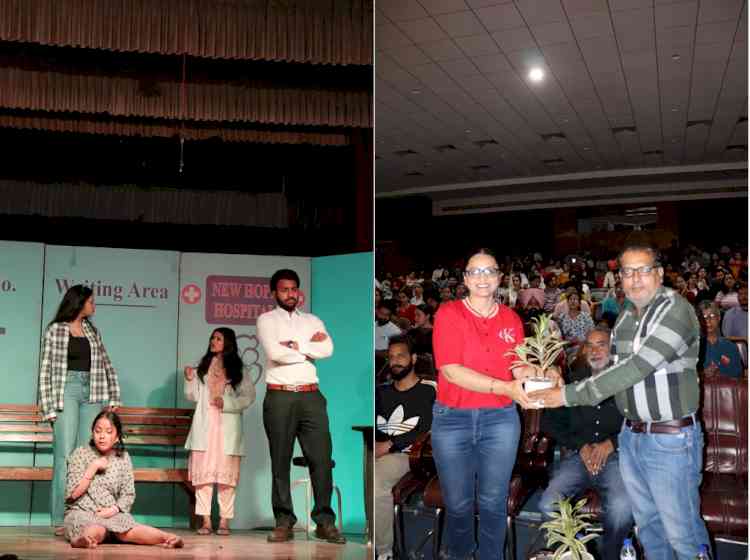Panel discussions on the theme “Working of NDPS Act in Punjab”

Chandigarh, February 26, 2019: The Centre for Human Rights and Duties in collaboration with VIDHI-Centre for Legal Policy, New Delhi organized panel discussions on the theme “Working of NDPS Act in Punjab” here today.
Justice Ranjit Singh (Retd.), Punjab and Haryana High Court in the presence of Professor Devinder Singh, Secretary to Vice Chancellor, Panjab University; Neha Singhal (VIDHI) and Dr. Namita Gupta, Chairperson Centre for Human Rights and Duties, Panjab Universitylaunched the report compiled by Vidhi Centre on the theme of ‘From Addict to Convict: The Working of the Narcotic Drugs and Psychotropic Substances Act, (NDPS Act) in Punjab’.
Justice Ranjit Singh (Retd.) shared his experience from the ground reality which he has gone through while dealing with cases. He told that this is sad reality that Alcohol does not come under the NDPS Act. He elaborated on the issue that the unemployment of the youth leads them to drug abuse and drug addiction. Rehabilitation of the substance user is never the focus of judiciary, as it is already burdened with large number of pending litigations.
Prof. Devinder Singh, stated that strong law work as a deterrent. Hence, it is very important that law must be implemented in true spirit.He further discussed the positive role played by the government in the implementation of NDPS Act by giving example of his native place of Himachal Pradesh.
Ms. Neha Singhal, Sr. Resident, VIDHI, author of the report briefed about the report and discussed various aspects of the project conducted by the VIDHI. She said, “the NDPS Act has failed to meet its twin objectives of deterrence and rehabilitation in Punjab. On the one hand the NDPS Act seeks to control both the demand and supply of drugs by criminalising production, trafficking and use. On the other hand,courts have never diverted any addict into the de-addiction system, stymieing a major objective of the law.”
Mr. B. Chandra Sekhar, (IPS), Inspector General of Police, Special Task Force, Punjab Police stated that there are four components of Criminal Justice System in India: Police, Prosecution, Judiciary and Jails. He said that if we want the police to work honestly, it should be independent from political influence and simply blaming police will not serve the purpose of the NDPS Act. He explained about the prevention part to restrict the drug abuse which has three sections: Buddy programme, Drug Abuse Prevention Officer and Awareness Campaigns which involve various activities to incude the drug addicts in various positive activities like as Swachhta Abhiyan, Yoga, meditation and Thikri Pehra (which is local people’s initiative in which they become surveillant) etc. He also explained how under these programmes they generate awareness among the school and college students regarding the ill effects of the drugs on their health. At the end he said nothing can be done without the help of the society because police is also the reflection of the society.
Dr. Upneet Lalli, Deputy Director, Institute of Correctional Administration, Chandigarh focused her discussion on the issue of drug abuse in the prisons and its bad effects not only on the prisoner but also on the society. She further explained the difference between drug users (90%), drug abuses (50%) and drug addicts (40%) of total drug addict population. She told that there are many people who have never taken the drug in outer world but they ended up taking drugs in prisons. Just putting the addicts in prison doesn’t solve the problem, we need to see drug abuse as a public health issue.
Dr.Meenu, Deputy Director- Targeted Intervention, Punjab State AIDS Control Society focused mainly on the issues of the HIV AIDS victims and their problems. Drug abusers doesn’t get the opportunity if they want to go for treatment or to jail but such option has been given by Punjab State AIDS Control Society. The session was followed by question and answer round.
The theme of the second panel discussion was ‘Experiences from the Field’. Dr. Namita Gupta, Chairperson Centre for Human Rights and Duties, Panjab University, Chandigarh was the moderator of the session. Mr. Manish Kumar, Team Leader Technical Support Unit for Promotion of Youth and Masses (SPYM) while sharing his experience from the field said that 80 % of cases can be treated by OPD services but the irony is people’s unawareness to opt for such services. He also highlighted the role of family from process of admission till the full recovery of the patient. He also mentioned the three problems they have faced of substance abuse: acceptance of substance abuse, adequacy of services and utilization of the services. He also mentioned the Humanitarian aspect in substance abuse.
Mr. Raj Kumar, Project Manager, Swami Vivekananda Medical Mission, Amritsar elaborated on the importance of law enforcement agencies which should collaborate and ensure their availability with NGOsso as to effectively implement the programme which is basically advocacy i.e. harm reduction (part of NACO).
Mr. Pardeep Kumaran ex-drug user and a peer educator shared his own story that how he started using drugs at the age of 18 years and how he struggled to survive. He also mentioned that how his family helped him in coming out of use of substance abuse.
Dr. Namita Gupta, Chairperson Centre for Human Rights and Duties summarized the panel discussion by stating that all the stakeholders need to come together to find out workable solutions to the rising problem of substance use in Punjab. An active role needs to be played by civil society, academicians as well as mass media to identify the reasons, to find out methods to cure the addicts and also to rehabilitate the victims.
The session ended with active participation from audience comprising of students from Centre from Human Rights and Duties, Panjab University and VIDHI members.

 cityairnews
cityairnews 
















